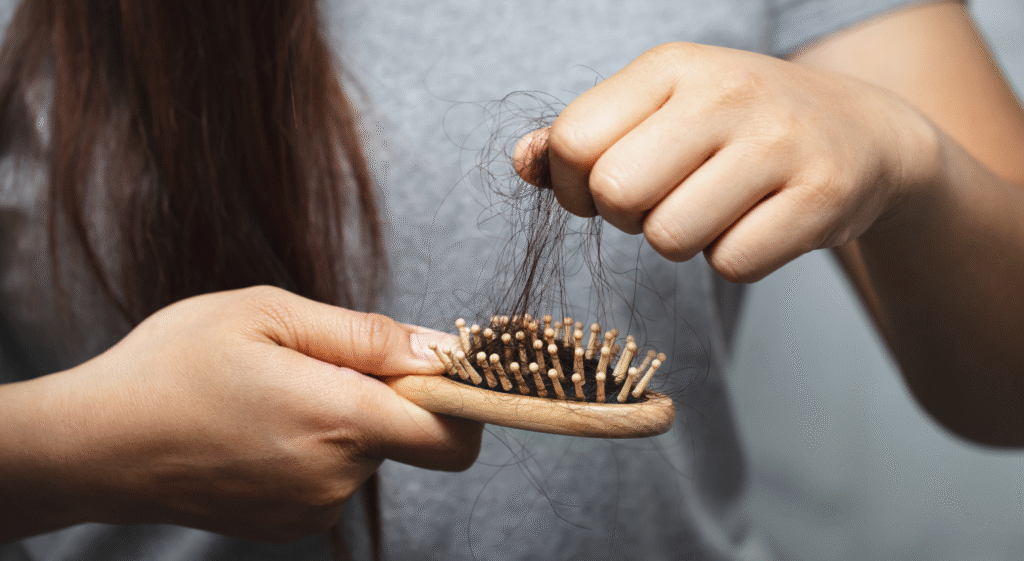Hair is often considered a symbol of beauty and confidence. But for many people, excessive hair fall becomes a frustrating problem. Losing a few strands daily is normal, as it is part of the natural hair cycle. However, when hair starts falling in larger amounts, it signals an imbalance or issue that needs attention.
Hair fall control is not about stopping hair fall completely, but about reducing it to a normal level and promoting healthier growth. There are many factors that can lead to hair loss such as stress, poor diet, hormonal imbalance, or even genetics. The good news is that with the right care and lifestyle changes, hair fall can be controlled and managed.
This article will cover the causes of hair fall, natural remedies, lifestyle tips, and medical treatments that can help you regain confidence in your hair.
Common Causes of Hair Fall
Understanding the reasons behind hair fall is the first step toward finding a solution. There are many different causes, and sometimes more than one factor may be responsible.
One of the most common reasons is stress. Physical or emotional stress puts pressure on the body and can disturb the hair growth cycle. Similarly, a poor diet lacking in vitamins, proteins, and minerals weakens hair roots and leads to shedding.
Hormonal changes, especially in women, are another major cause. Conditions like pregnancy, menopause, or thyroid problems affect hair health. In men, male pattern baldness is often linked to genetics and hormonal activity.
Other reasons include excessive use of chemical-based products, frequent styling with heat, scalp infections, or even pollution. By identifying the cause, you can choose the right hair fall control method and prevent further damage.
Natural Remedies for Hair Fall Control
Nature offers many safe and effective ways to reduce hair fall. These remedies are easy to try at home and can strengthen hair roots over time.
Oil Massage
Regular oil massage improves blood circulation in the scalp. Oils like coconut, almond, and castor oil nourish hair roots and reduce dryness that often leads to breakage.
Aloe Vera
Aloe vera is known for its soothing and healing properties. Applying fresh aloe vera gel to the scalp helps reduce dandruff, strengthens roots, and keeps the scalp healthy.
Onion Juice
Though it may not smell pleasant, onion juice is a powerful remedy. It contains sulfur, which boosts collagen production and improves hair growth. Applying it twice a week can show visible results.
Fenugreek Seeds
Soaked fenugreek seeds, when ground into a paste and applied to the scalp, help in controlling hair fall. They are rich in proteins and nicotinic acid, which are great for strengthening hair follicles.
Lifestyle Tips for Healthy Hair
Apart from home remedies, lifestyle changes play an important role in controlling hair fall. The way you eat, sleep, and manage stress directly affects your hair.
Balanced Diet
A diet rich in proteins, vitamins, and minerals is essential for hair health. Include foods like eggs, nuts, spinach, carrots, and fish in your daily meals to strengthen hair from within.
Proper Sleep
Lack of sleep increases stress and weakens the body’s repair system. Getting 7–8 hours of quality sleep helps the body recover and supports healthy hair growth.
Reduce Stress
Yoga, meditation, and regular exercise are effective ways to reduce stress. A relaxed mind and body improve overall health, including hair.
Gentle Hair Care
Avoid harsh shampoos and do not wash hair with very hot water. Using mild products and gently drying hair with a soft towel prevents unnecessary breakage.
Medical Treatments for Hair Fall
Sometimes, natural remedies and lifestyle changes may not be enough, especially if the cause is genetic or medical. In such cases, professional treatments can help control hair loss.
Medicated Shampoos and Serums
Dermatologists often prescribe shampoos and serums with ingredients like minoxidil, ketoconazole, or biotin. These products strengthen hair and reduce shedding.
Laser Therapy
Low-level laser therapy is a modern treatment that stimulates hair follicles. It improves blood flow in the scalp and supports new hair growth over time.
Platelet-Rich Plasma (PRP) Therapy
PRP therapy involves injecting your own platelets into the scalp to boost hair growth. It is safe and has shown promising results for many people facing severe hair fall.
Hair Transplant Surgery
For those with permanent hair loss, especially men with bald patches, hair transplant surgery is an option. It involves moving healthy hair follicles from one part of the scalp to another.
Conclusion
Hair fall can be worrying, but it is not something you have to accept without solutions. By identifying the causes and following simple remedies, you can take control of the problem. Natural options like oil massage, aloe vera, onion juice, and fenugreek seeds are safe and effective. Along with these, lifestyle choices such as eating a balanced diet, managing stress, and getting proper sleep are equally important.
For those with severe or persistent hair fall, medical treatments like PRP therapy, laser treatment, or even hair transplants offer professional help. The key is not to ignore hair fall when it becomes excessive, but to act early and consistently.
In the end, hair fall control is about balance—a mix of natural remedies, healthy habits, and professional treatments when needed. With patience and care, you can reduce hair loss and enjoy stronger, healthier, and more confident hair.



